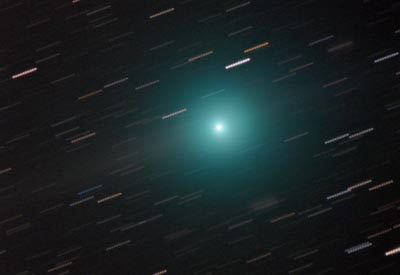Comet
Lulin
Bright
comet in Libra
Uploaded
2/5/09


Comet image taken 2/4/09 at 4 am
|
The field of view at left is .75 degrees
wide and .5 degrees tall.
Select an image size for a larger view:
1024 x 768
1600 x 1200
|
|
Now only 20 days
from closest approach, this 6th magnitude object glows a bright
cyan color from ionized gasses as it speeds toward a rendezvous
on Feb 25th. The extension seen on the left of the head is the
comets dusty anti tail, as we are nearly in the orbital plane
of the comet now. This image is tracked on the comets nucleus,
and shows the stars speeding by in the 30 minutes it took me
to shoot the comet. Small gaps in the star trails are due to
the 8 second download time from the camera between exposures.
Processing:
R,G,and B images
were stacked separately an then combined to a color image and
gamma stretched. The shadow/highlight tool was used slightly
to improve the anti tail contrast. To properly color the stars,
a single RGB set was layered 30 times over this image combining
with Hue. The stars were shifted to cover the trails individual
components with the correct G2V color. A mask was used near the
comets core to keep the color details of the comets central area
from blurring. This the the first time I had ever tried this
trick.
|
Instrument: 12.5" f/5 Home made Newtonian
Mount: Astrophysics 1200 QMD
CCD Camera: SBIG 10XME NABG with Enhanced Water Cooling
Guider: Meade DSI PRO w/Lumicon Newt Easy Guider
Exposure: RGB = 10:10:10 (30x1m)
AstroDon RGB Combine Ratio: 1: 1.05: 1.11
Location: Payson, Arizona, Elevation: 5150 ft.
Sky: Seeing FWHM = 10 arcsec (Maxim DL - 10min subframe), Transparency 9/10
Outside Temperature: 42 F
CCD Temperature: -30 C
Image Processing Tools:
Maxim DL: Calibration, deblooming (Starizona Debloomer), aligning, stacking
Gralaks Sigma: Stacking
PixInsight: Curves, Deconvolution, noise reduction
Photoshop CS2: Curves, Color Correction, Cleanup
HOME GALAXIES EMISSION NEBS REFLECTION NEBS COMETS
GLOBULARS OPEN CLUST PLANETARIES LINKS

|